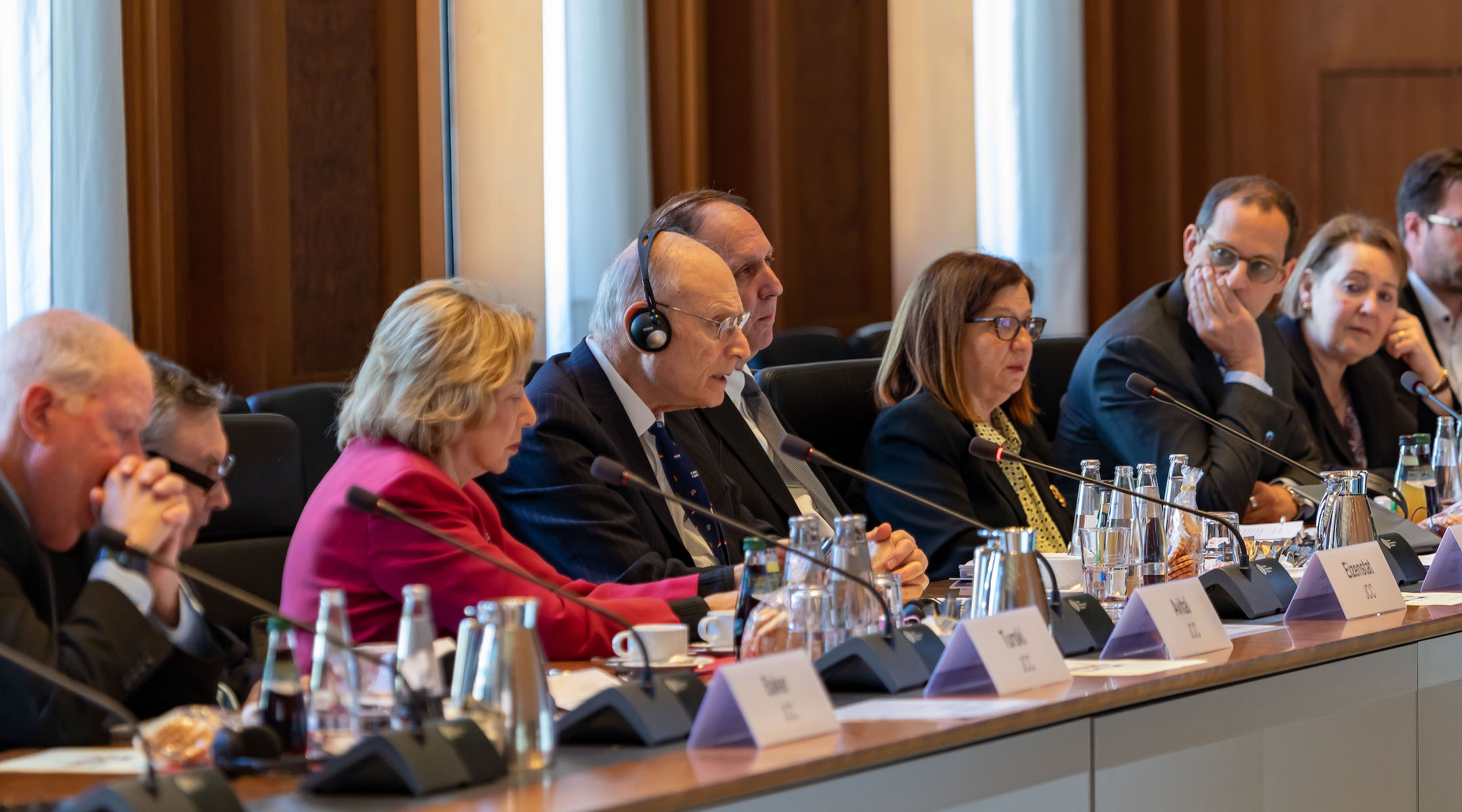Germany agrees to record $1.4 billion in annual Holocaust reparations as survivors age
The figure reflected a recognition that, even as the number of Holocaust survivors dwindles with each passing year, the needs of the remaining survivors are increasing as they age

Claims Conference delegation for negotiations with the German government on behalf of Holocaust survivors in Berlin, Germany, May 8, 2023. (Courtesy of Claims Conference)
(JTA) – Conditions didn’t seem favorable in early May as Stuart Eizenstat entered annual negotiations with the German government over reparations for the estimated 240,000 remaining Holocaust survivors around the world.
Eizenstat had served as the special negotiator for the Conference on Jewish Material Claims Against Germany since 2009, and had analyzed the country’s economic and political landscape: high inflation, spiraling fuel costs and unprecedented government spending on defense to support Ukraine in its war with Russia. Add to that a German finance minister, Christian Lindner, who was elected less than two years on a platform of budget cuts, fiscal restraint and smaller government.
“We’re dealing with German taxpayer money. That has to be accounted for. And we’ve been in an era in the last couple of years and particularly this year with negative factors that would seem to have an inauspicious impact,” Eizenstat said in an interview.
Yet the compensation package Eizenstat helped secure for the Claims Conference — more than $1.4 billion — was the largest monetary figure agreed to for a single year since German reparations began more than seven decades ago. The figure reflected a recognition that, even as the number of Holocaust survivors dwindles with each passing year, the needs of the remaining survivors are increasing as they age.
Some of the $1.4 billion that Germany agreed to spend will be paid directly to survivors; the bulk will fund social welfare services such as home care and food packages, administered through about 300 agencies across 83 countries. Germany also agreed to boost funding for Holocaust education programs.
“This is perhaps the most productive session we’ve ever had,” Eizenstat said. “And the fact that it has occurred almost 80 years after the war is a testimony to the Claims Conference’s relentless pursuit of justice and the partnership that we’ve had with the German government.”
Total direct compensation to survivors is expected to reach $535 million next year, mostly paid out in pensions to survivors. In addition, negotiations resulted in four more years of hardship payments — direct allocations to survivors who have not qualified for pensions —which were introduced following the start of the COVID-19 pandemic in 2020. More than 128,000 survivors can expect to receive 1,250 euros each, or about $1,360, in 2024, an amount that will go up by 50 euros each year through 2027.
The hardship payments were negotiated on top of the regular Holocaust survivor pensions, and they primarily benefit Jews from the former Soviet Union who were not interned in camps or placed into ghettos and were therefore not included in the pension program. These Jews survived Nazi mobile killing units that murdered more than 1 million Jews, including entire communities, and today are more likely to experience poverty.
Another category of aid has skyrocketed over the past two decades: social services. German spending in this category will reach about $890 million in 2024, an increase of $105 million over last year. Fifteen years ago, the total was less than $50 million.
In 2023, 120,000 survivors received home care, medical transportation and other forms of support through Jewish social service agencies.
“Survivors are getting more frail, and they are needing more hours of care, and more assistance,” said Reuben Rotman, president and CEO of the Network of Jewish Human Service Agencies.
The agencies represented by Rotman’s group keep track not only of the services they have provided to survivors but also of unmet needs. So if a survivor needed 20 hours of care but received only 12 due to funding constraints, the gap would register in data collected by the Claims Conference.
“The Claims Conference goes back to Germany each year and aggregates all the unmet needs for all the organizations that are funding and makes the case for increases. And generally, they’ve been successful in those negotiations,” Rotman said.
Germany also agreed to continue increasing funding for Holocaust education around the world, providing the Claims Conference with about $150 million for educational programs over the next four years. The money is meant to counter findings from recent surveys showing that the public is growing less knowledgeable about the Holocaust as it recedes further into the past.
According to a 2018 survey commissioned by the Claims Conference, nearly half of American adults could not name a single concentration camp and almost a third were under the impression that the number of Jewish victims was far lower than the 6 million who were murdered.
The Claims Conference’s education budget helped pay, for example, for the production of “Son of Saul,” a 2015 Hungarian film set in the Auschwitz concentration camp that won an Oscar for best foreign film.
Exposure to survivors and education about the Holocaust deserve credit for the successful outcome of this year’s negotiations, according to Eizenstat. He noted that in the leadup to the formal meetings, chief German negotiator Luise Hölscher was taken on a tour of the Yad Vashem Holocaust museum in Jerusalem; Polin, a Jewish history museum in Warsaw; and the United States Holocaust Memorial Museum in Washington, D.C.
“I took Luise for three hours before the negotiation and introduced her to three of our survivors who are docents at the Holocaust Memorial Museum,” Eizenstat said. “It really gave her a historical sense of the Holocaust, but also how much these funds mean to the dignity of survivors.”
Later this year, the Claims Conference will release what it says is the most comprehensive demographic report on survivors ever, detailing where they live, broken down by country and city.
This article originally appeared on JTA.org.






















